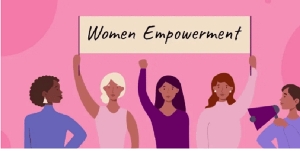Women's empowerment is the process of supporting women in taking control of their lives, making their own decisions, and developing their full potential.
For many years, women have been deprived of having full control over their lives and decision-making. In some instances, women are not allowed to exercise their political rights, such as voting, or their fundamental rights, such as equality or even access to education. These issues are attributed to the stereotype
that a woman's place is the home.
However, women, who are considered a marginalised group in societies around the world, contribute very little to the process of development. Despite the
progress in recent years, women still need to be more represented in attaining leadership roles and administration.
In countries where gender equality remains a significant challenge, empowering women to reach higher leadership positions cannot be underrated. In Ghana, less than 40 percent of women are in leadership positions. According to the 2022 Voluntary National Review Report, as of 2021, women's involvement in parliamentary, political, and public spheres has shown overall improvement. However, there was a decline in the representation of ministers and chief directors. Notably, deputy ministers recorded a significant increase to 27 percent from 14 percent in 2020. Despite progress, targets for women's participation were not fully achieved in 2021. The lack of diversity limits organisations' potential to thrive and reinforces gender biases.
Embracing diversity and inclusion can lead to better decision-making, increased innovation, and a more positive working environment for all, especially women. Empowering women in leadership is crucial for societal progress. Addressing barriers and advocating for gender diversity promotes fairness and drives
innovation.
This article highlights the importance of empowering women in leadership, advocating for policy changes to foster equality, and creating a future where everyone has equal opportunities for success. This discussion stresses the vital need to empower women in leadership, tackle systemic barriers, and advocate for policy changes to foster gender diversity. The goal is to create an equitable society where women have equal opportunities, maximising their contributions to
organisational success and societal advancement. By addressing these barriers that hinder women and advocating for policies that promote gender diversity and inclusion, there will be a more equitable future for all.
Women's empowerment is one of the most efficient ways to break barriers and attain higher heights. It encourages and promotes women by forming a network of women who inspire each other with their success and experience. Networking is a powerful tool that focuses not only on sharing knowledge but also on the collective strength it brings to a group.
These efforts are implemented through workshops and seminars for emerging women. Progress in empowering women can be tracked by mentorship pairings, the duration of mentorship relationships, the mentees' outcomes, and the mentorship programme's overall success in supporting women's career progression. Kraweck asserts, “When in doubt, you’re likely to lean on your network, especially those in a women’s network.”. In this manner, women can mutually support one another and ascend the leadership hierarchy collectively.
This quote says, "Because I am a woman, I must make unusual efforts to succeed. If I fail, no one will say she doesn't have what it takes. "Women don't have what it takes" (Young, 2011, p. 74)" is a powerful tool by an African scholar that aimed to portray the typical stereotype faced by women in leadership components and those aiming to be in that position.
Over the years, women have advocated for gender equality and empowerment, showcasing their competence and contributing to various fields. However, the efforts of women are sometimes misinterpreted, leading to harmful stereotypes that hinder their advancement into leadership roles. One common stereotype is that women are less skilled than their male counterparts.
This bias can result in women being overlooked for leadership positions. The debate surrounding whether women should break barriers and ascend to higher leadership positions creates internal and external dilemmas, while many argue for gender equality and believe women deserve these roles.
Despite their pivotal contributions to advancing women's empowerment and equality, EPL Ghana is committed to implementing policies and practices that foster a more equitable and inclusive environment, enabling women to thrive in leadership roles. To enhance the capacity of young women to attain empowerment, EPL Ghana aims to recruit young women through training and guidance to enable them to achieve greater roles. But why should this be important?
What contribution do women offer when granted the opportunity to attain higher positions? Is it an important issue to focus on? By actively promoting and supporting women in their career advancement, EPL Ghana helps break down barriers that prevent women from reaching leadership positions by providing
mentorship training and development opportunities focusing on women. This effort can inspire women to pursue their leadership ambitions and create a more diverse and inclusive workforce for future generations.
EPL Ghana mentorship programmes pair fellows with seasoned professionals. Also, senior female executives’ mentor the younger women by supporting them
to navigate challenges, build their confidence, and enable them to access leadership opportunities. During this process, fellows can access leadership positions, assert their rights, and contribute to decision-making processes at all levels.
This article highlights the enduring gender disparities in leadership, shedding light on the entrenched biases and institutional obstacles that impede women's advancement to senior positions. Despite incremental progress, these barriers remain formidable, yet the positive impact of women's leadership cannot be overstated. Women in leadership bring invaluable qualities such as creativity, innovation, empathy, and collaboration, fostering higher levels of employee engagement and creating more inclusive work environments across various sectors.
It is imperative to implement targeted interventions aimed at dismantling these barriers and promoting gender diversity in leadership. By striving for greater representation of women in leadership positions, organisations stand to gain diverse perspectives, drive innovation, and enhance overall performance in today’s fiercely competitive landscape. Maya Angelou asserts, “Each time a woman stands up for herself, without knowing it, possibly, without claiming it, she
stands up for all women.”.
Achieving gender parity is not just a matter of equity. It is a strategic
imperative for organisations seeking sustained success and relevance in the 21st century.
Opinions of Wednesday, 20 March 2024
Columnist: Jennifer Ganyo
Breaking barriers: Empowering women to attain higher leadership heights
Entertainment

Chez Amis CEO addresses NACOC arrest allegations
Opinions












